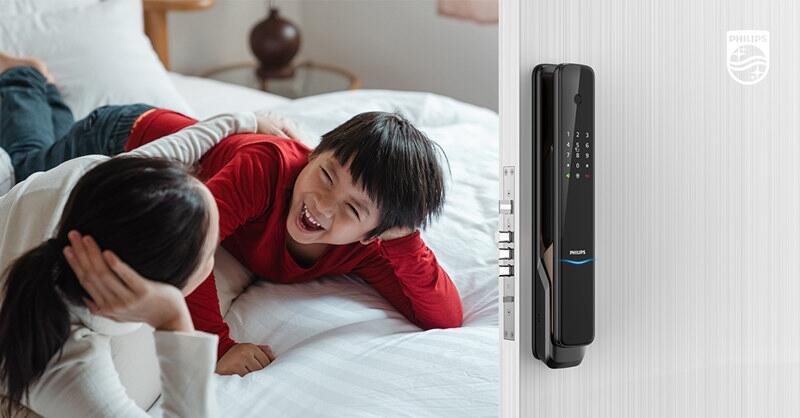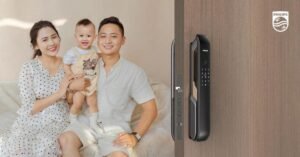Smart locks are becoming more popular in the ever-changing world of home security because they provide homeowners with both convenience and peace of mind. The Philips smart lock is the most cutting-edge and user-friendly choice compared to the competition.
However, many potential customers still have a pressing concern: do smart locks lock on their own? The answer is YES, like Philps smart lock solution, it supports auto mode or manual mode. When users set auto mode, the mortise will latch out automatically when you close the door. You don’t need to do anything or worry about anything like if the door is unlocked.
The interesting world of smart locks is explored in this article, including their autonomous locking capabilities and what to look for when choosing the best smart lock for your house.
How Do Smart Locks Work?
Smart locks have changed the way houses are secured in the modern digital era. These high-tech tools combine safety and convenience, letting homeowners regulate who has access to their houses whenever they choose. But how do these smart locks work? Discover how these cutting-edge tools function by looking at their construction.
- Connectivity
Wireless communication is essential for smart locks to interact with other gadgets and infrastructure. Modern smart locks communicate with nearby devices through wireless networks like Bluetooth or Wi-Fi or even voice-activated digital assistants like Amazon’s Alexa or Google Home.
- Authentication
Smart locks’ primary purpose is authentication. Keyless access is replaced with biometric scanning (fingerprint or face recognition), a keypad, or proximity sensors in smart locks. These safeguards make keyless entry impossible for anyone who cannot enter.
- Mobile Apps
Mobile apps designed specifically for use with smart locks are becoming more common. Homeowners can control access to their homes, monitor use, and maintain battery life all from their smartphones with the help of these applications.
- Connectivity to Smart Home Technology
Smart locks’ interoperability with other home automation features is a major plus. They are easily compatible with smart home gadgets like security cameras, video doorbells, and smart bulbs. This combined functionality may manage and automate home security systems more effectively.
- Power Supply
Power is necessary for the operation of smart locks. Models are available that run on batteries, or that may be hooked into the house’s electrical system. Smart locks that rely on batteries often send warnings or flashing lights when the power is low, giving homeowners plenty of time to swap them out.
Smart locks are a safe and dependable option for controlling who has access to your property. Wireless technology, biometric identification, smartphone applications, home automation integration, and stable power sources have all contributed to this revolution in home security.
Do Smart Locks Lock on Their Own?
Smart locks have changed the game regarding home security since they allow us to monitor and manage our properties from afar. Whether or not a smart lock will lock automatically is a common concern among those considering purchasing one. In the following paragraphs, we’ll dig into the interesting world of smart locks, discussing their automatic locking features and what users should look for in a good smart lock.
Self-Locking Capabilities and Features of Smart Locks
There are some following features about self-locking of smart locks:
- Ultraviolet Distance Sensors
Proximity sensors can tell when someone is approaching or leaving the property and are thus included in many smart locks. When you leave a specific distance from the entrance, the sensors will trigger and lock the door behind you, keeping your house safe without further effort.
- Geofencing Technology:
Smart locks sometimes have a geofencing function, which uses the smartphone’s GPS to detect when you’ve left a predefined region (like your house). Smart locks give extra protection by locking automatically when your phone leaves a predetermined area.
- Timed Locking System
Some smart locks also include an automated locking function that may be set to go into effect at certain times. People who lead hectic lives and are prone to forgetting to shut the door behind them will find this feature very helpful. If a user wants to make sure their house is always safe, the user may program the smart lock to activate at a certain time each day.
- Connectivity to Home Automation Systems
Many modern smart locks may be easily connected to other automation systems in the house. When all the people in the house leave, or at a given the time of day, the smart lock may automatically lock because of a routine or scenario you set up in the smart home system.
Things to Think About When Choosing a Smart Lock
While the concept of a self-locking smart lock may be tempting, there are a few things to keep in mind before making a purchase:
- Reliability
When shopping for a smart lock, choosing one with a history of dependable autonomous locking is important. Check out how well and reliably customers rate and review the lock.
- Choices for Personalization
The degree of personalization available for autonomous locking features among various smart locks varies widely. Think about whether you’d want a lock with fixed choices or one that can be customized to your needs.
- The Energy Supply
Locking mechanisms without human intervention need a power source, usually batteries. Whether a smart lock uses batteries, make sure you know how long they last and whether they notify you when they’re getting low so you can keep your house secure.
Finally, although not all smart locks lock automatically, many use proximity sensors, geofencing technology, and scheduled locking functions. These cutting-edge features, in addition to the potential for interaction with smart home systems, provide homeowners with extra comfort and safety. Choosing a smart lock that matches your home’s security requirements requires considering factors like dependability, customization possibilities, and power supply.
Self-Locking Mechanisms in Smart Locks
Smart locks, with their automatic locking mechanisms, have completely changed how we think about home security. There is no need to check again or run back to the house to make sure the front door is secured anymore. With the development of IoT, smart locks have emerged as a practical solution to the problem of forgetting to lock the door.
Self-locking functions in smart locks are often engaged in response to predefined conditions or events. Some smart locks, for instance, include proximity sensors that can tell when you’ve left your home’s immediate neighborhood. The door will lock itself when you’ve walked a specified distance away. This effortless and hands-free operation will keep the home safe while you’re busy with other things.
Smart locks also use time-based locking as another method. For further security, users may schedule automatic door locking at certain times. Those who favor a regular schedule or live hectic lives would appreciate this. Users may enjoy a worry-free atmosphere and heightened peace of mind by setting the smart lock to automatically lock at certain times, such as when they go to bed or leave for work.
Not all smart locks can lock themselves, and the availability of this function may vary by manufacturer and model. Therefore, while shopping for a smart lock, it is essential to check the product details to make sure it has the needed autonomous locking features.
Finally, self-locking mechanisms have become a major improvement in smart locks, delivering extra convenience and security to house owners. Smart locks make our lives easier and our houses safer by locking themselves upon detection of an intruder or according to a set schedule.
What are the Benefits and Considerations of Self-Locking Smart Locks?
Self-locking smart locks have been more popular among homeowners who want to make their houses more secure and convenient. Incorporating cutting-edge technology to streamline the locking procedure, these innovative gadgets provide several advantages. However, before deciding on a smart lock that locks itself, there are a few things to remember. Let’s examine the pros and downs of using such state-of-the-art security measures.
- Automation and Ease of Use
The ease of use of self-locking smart locks is a major perk. It’s common for homeowners to need to remember to lock their doors while using standard locks, leaving their houses open to burglary. By locking themselves after a certain amount of time, self-locking smart locks prevent this problem from occurring and keep your house safe even if you fail to do so. Because of this safety measure, you won’t have to worry about anything.
- Better Safety Measures
Smart locks that lock themselves give an extra layer of protection. The possibility of inattention or carelessness in locking the door is removed since it locks itself. Users may be certain that their house will be secure even if they are in a hurry or unable to use both hands to lock the door. In addition, these locks often have sophisticated encryption and authentication methods that make them difficult to compromise.
Considerations:
When choosing a self-locking mechanism, keep in mind the following:
- Privacy Issues
Self-locking smart locks provide convenience and security, yet some people may be wary of them due to privacy issues. These locks may have privacy concerns since they may connect to the internet and potentially collect data about your lock use. Choosing a dependable company like Philips that places a premium on data security is important when selecting a smart lock manufacturer.
- Dependability and Compatibility
Unfortunately, not every door or lock system can accommodate a self-locking smart lock. When selecting a lock, it’s crucial to consider how it will work in the circumstances. These locks’ technological nature also means they are susceptible to occasional technical difficulties or connection concerns. Picking a reliable manufacturer’s lock is important, as is having a backup strategy in case the lock’s technology fails.
Forgetful homeowners need not worry about the safety of their homes thanks to self-locking smart locks, which provide several advantages. When choosing a self-locking smart lock, it’s crucial to keep privacy in mind and check for compatibility and dependability. If you do your research, you can take benefit of this cutting-edge technology without sacrificing your safety or peace of mind at business.
What about Flexibility in Configuration and Management of Smart Lock Like Philips?
Like other such products, the Philips smart lock gives homeowners a wide range of choices for personalization and management. No longer will you have to fumble around for keys or second-guess whether you remembered to lock the door. When you install smart locks, you may modify your security to fit your lifestyle.
The ability to set separate passcodes is the first step toward customization. Only by giving out real keys, anyone may let in guests, whether they’re family, friends, or service providers. Users have complete control over who may enter their house and when using a mobile app or a web interface to manage access credentials.
In addition, many modern smart locks include sophisticated scheduling functions that let users automatically lock and open the door at certain intervals. This may be an invaluable tool for homes with set schedules or property managers. To ensure the home is always safe without any effort, you may set the lock to lock and open at certain times of the day.
Smart locks may be integrated with other smart home devices, which provides another interesting customization option. Operating many modern smart locks by just speaking instructions into a compatible voice assistant, such as Amazon Alexa or Google Assistant, is possible. They may also work with other smart devices, including security cameras and alarm systems, to form a fully integrated system for protecting the house.
To sum up, smart locks allow users to increase their property’s safety via various customization and control choices. Homeowners benefit greatly from these capabilities since they allow for creating unique access codes, automating lock operations, and integrating with other smart devices.
Concluding Remarks
Smart locks, which allow users to regulate who has access to their houses remotely, are changing the game in terms of security. Even though not all smart locks auto-lock, this safety and convenience function has been possible thanks to technological improvements.
The Philips smart lock is one such device since it provides the added benefit of locking itself when a certain amount of time has passed. As technology develops, smart locks become more important in making homes safer and more convenient for inhabitants.




